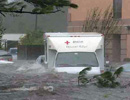| Joseph Sher blamed much of the damage to his New Orleans apartment complex on water that inundated the city when levees failed in the aftermath of Hurricane Katrina. He sued Lafayette Insurance Co. after the insurer denied most of his claims by saying they were caused by "flood" and therefore not covered by his hazard policy. Sher won a jury verdict in state Civil District Court that put the firm on the hook for the cost of repairs. The state's 4th Circuit Court of Appeal also sided with Sher in November. Now Sher's case is one of two scheduled to be heard Tuesday by the state's highest court that have high-stakes implications for Louisiana's insurance market. Both cases going before the Louisiana Supreme Court involve disputes over policy language between insurance companies and property owners after 2005 hurricanes Katrina and Rita. Lafayette and other insurers say their homeowner policies don't cover damage from any type of flooding, including water from a levee breach. "A flood is a flood, without regard to cause," said Jim Whittle, assistant general counsel for the American Insurance Association. In a separate but similar case last year, the 5th U.S. Circuit Court of Appeals in New Orleans ruled that insurers aren't obligated to cover water damage from a levee failure. Last week, the U.S. Supreme Court declined to hear appeals in that case from Xavier University and dozens of other Louisiana policyholders. James Garner, one of Sher's lawyers, said the federal courts shouldn't have the last word in the dispute over damage from a levee breach. "One thing is certain: the Louisiana Supreme Court makes Louisiana law, not the 5th Circuit," Garner said. The state Supreme Court also was scheduled to hear arguments Tuesday in a case centered on Louisiana's Valued Policy Law, which applies when a home is destroyed. Mark and Barbara Landry, whose Vermilion Parish home was demolished during Hurricane Rita, sued Louisiana Citizens Property Insurance Corp. after the company denied their claim. The Landrys argued that the Valued Policy Law requires Citizens to cover all of the damage to their home, even if only part of the damage was caused by wind — a covered peril — while the rest was caused by flood water — a non-covered peril. Citizens and other insurers say their policies cover damage from wind but not rising water, including wind-driven storm surge, and deny that the Valued Policy Law obligates them to pay for flood damage. |





